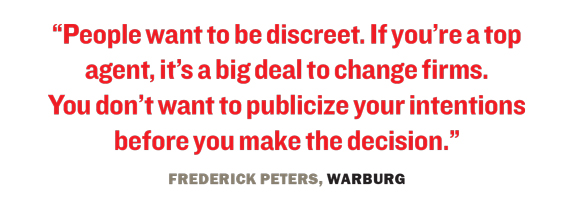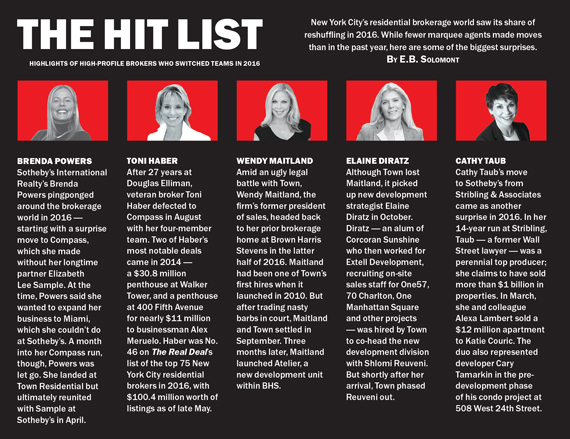Richard Steinberg, a longtime Warburg agent who recently defected to Douglas Elliman [TRDataCustom], was on vacation in Jamaica when he finally decided it was time to make a professional move.
“I was at a bar and I had a few drinks and I said to my wife, ‘First thing on Monday I’m calling my friend at Douglas Elliman and asking for a meeting,’” recalled Steinberg.
When Steinberg did call his friend — a longtime golf buddy who had been urging him to hear the firm’s pitch — they opted to meet at a nondescript coffee shop on East 59th Street when he returned to New York.
The decision to find an under-the-radar location was not an accident.
In today’s ultracompetitive residential brokerage world, much of the agent wooing is done in a covert manner to avoid sparking rumors or tipping anyone off.
In November, Corcoran Group CEO Pam Liebman recalled how she recently met with a high-level broker at PDT, or Please Don’t Tell, a secret Lower East Side speakeasy where guests have to enter another restaurant, go into a phone booth and then make a call to get inside.
And Stuart Siegel, the CEO of residential brokerage Engel & Völkers’ New York City operations, recently told TRD that he feels like he’s “in a Jason Bourne novel,” referring to his stealth meetings with potential agent recruits.
“The clandestine meetings are always held in secret because, you know, they’re only conversations to begin with. It’s not a contract until it’s a done deal. You aren’t going to jeopardize anything,” said Mickey Conlon, who jumped to Elliman from CORE last year with husband and business partner Tom Postilio.
Warburg CEO Frederick Peters said that while recruiting Mary Dunne from Corcoran in August, he met her at his office around 6 or 6:30 p.m., when almost everyone else was gone.
“People want to be discreet,” he said. “If you’re a top agent, it’s a big deal to change firms. You don’t want to publicize your intentions before you make the decision.”
Often, agents hide their intentions in plain sight by lying about why they are showing up at a rival firm. “You say you’re there working on a ‘board package’ or a ‘co-listing,’” said one agent who switched firms last year.
These days, few firms are sitting on the sidelines of what’s become an all-out arms race for agents. In addition to wining and dining brokers in secret underground bars and restaurants, firms are, more importantly, dangling outsize checks and promising lofty marketing budgets and new development listings to potential recruits.
“In the old days, I feel like we were selling brand and culture,” said Peters, explaining that the landscape for recruiting residential brokers has drastically shifted in the last few years. “A lot of what we’re selling [now] is, ‘Who’s the shiniest penny with the biggest pocketbook?’”
Ego boost
The driving force behind all of this is by most accounts the presence of the upstart brokerage Compass, which arrived on the NYC scene in 2013 with guns blazing. The firm has since taken an unprecedented approach to recruiting in a move that has not only won it agents, but has also prompted many agents throughout the industry to entertain conversations with brokerage heads and rethink their place in the industry.
Compass, unlike many of its competitors, has openly gone after new talent.
“The No. 1 goal is to get [prospective agents] into the office,” said a former employee. “It’s like an Apple store. It’s big, shiny, very tech startup-y. It gets people very excited.”
 The firm employs recruiters to cold-call prospective hires and sends automated text messages to agents encouraging them to speak with firm CEO Robert Reffkin.
The firm employs recruiters to cold-call prospective hires and sends automated text messages to agents encouraging them to speak with firm CEO Robert Reffkin.
If an agent replies, Reffkin has been known to respond personally in short order.
“A lot of agents are wooed by that. Even if they have a good relationship with Pam or Dottie or Howard, if a CEO of another company calls them, it’s a huge boon to their ego,” said one industry source, referring to the heads of Corcoran and Elliman.
Those solicitations, however, became fodder for a lawsuit this fall, when Elliman sued Compass President Leonard Steinberg and Vice President of Strategic Development Hervé Senequier — former Elliman star agents — for an “unlawful scheme” to recruit Elliman agents “en masse” and steal exclusive contracts.
Elliman alleged that Steinberg and Senequier targeted its former West 17th Street office, sending a “barrage of text messages, phone calls, and e-mails” to every agent and staffer there.
If true, the tactics appear to have paid off — about 40 New York Elliman agents have defected to Compass in the last two years, including 14 from the 17th Street office, according to the suit, which is pending. (Compass has also been sued by Corcoran and Citi Habitats for agent poaching, but those suits were settled.)
In response to Elliman’s suit, Compass argued that the firm was employing “a scare tactic designed to stem the loss of its agents.”
Elliman itself, however, targeted a number of top agents at Town Residential a few months back.
Amid internal turmoil at Town this summer — which pitted executive Wendy Maitland against firm head Andrew Heiberger and former company co-owner Joe Sitt — Elliman’s Executive Vice President Michael Signet seized on the opportunity.
“Based on recent happenings, I was wondering if you would be interested in meeting me for a cup of coffee or drinks after work,” he said in the email, which The Real Deal reviewed at the time. (Maitland ultimately joined her alma mater firm Brown Harris Stevens.)
And those firms are not the only ones making overtures.
Many of the city’s top agents told TRD that they regularly field calls from rival firms gauging their interest level.
“Every week we get a call from someone dangling something shiny, trying to get our attention,” said Conlon.
He said he and Postilio have learned that the more perks offered, the less substance there usually is. “You can give me a signing bonus, a Volkswagen, a circus pony. It’s not about that, it’s about long-term growth,” said Conlon, who explained that their move was driven by the desire to work with a global clientele.
Meanwhile, Cathy Taub — who left Stribling & Associates, her professional home for 14 years, to join Sotheby’s International Realty — was, ironically, prompted by a call from Compass’ Reffkin. After talking to him, she became open to the idea of moving and ended up jumping to Sotheby’s.
Sources say the uncertain state of New York’s residential market is generally prompting more brokers to take stock of their affiliations.
“More agents are impatient and hungry to change their business to see growth, which is something that firms leverage in their recruiting efforts,” said one industry veteran.
Red carpet treatment
While broker wooing often starts in the shadows, in many cases top brokerage executives look to impress new talent by rolling out the red carpet and bringing them to see-and-be-seen venues.
Real estate bigwigs have their favorite spots. Corcoran’s Liebman is a regular at Freds Restaurant at Barneys New York, while Elliman Chairman Howard Lorber dines at Cipriani. BHS’s Hall Willkie, meanwhile, frequents BLT and Le Bilboquet, and Reffkin is known to hit up the Strip House on East 12th Street with current and prospective agents.
Postilio and Conlon said that during their courtship with Elliman, they had lunch with Lorber at the Friars Club, where they’re all members.
“He knew everyone in the room,” Postilio said of the Elliman chief.
“Unfettered” access to the brokerage chairman was a key factor in their decision to move. “Today we pitched a major townhouse listing, and Howard came with us,” Postilio said.
During Town’s courtship of Brenda Powers — who ricocheted around the industry, moving from Compass to Town and back to Sotheby’s within the span of a few months — Heiberger took her to dinner at Mr. Chow in Tribeca.
One recent Corcoran recruit reported that his wooing started with lunch at Freds.
“That was nice, but at the end of the day, you need to do more than that,” said the agent, who met with Liebman and Bill Cunningham, the firm’s general sales manager.
“They said, ‘You’re going to be a star. We’ll train you, we’ll get you up and going.’ Hearing that confidence, at that moment it felt very, very assuring to me that they wanted to invest in me. That was what got me.”
And if brokers make the right move, it doesn’t always stop when they walk in the door at their new firm.
In early November, developer William Zeckendorf, whose Terra Holdings owns BHS, emailed several new agents who had all just defected from Town — Maitland, Ginger Brokaw, Jason Karadus and Terry Naini — inviting them to a celebratory dinner.
“I would really enjoy hosting a welcome to BHS dinner for all of you,” he wrote in an email seen by TRD. “How would Friday December 16 work? If not I have November 26 and I am sure other dates too.”
New development dibs
The key question for any broker deciding whether to jump ship is what’s being offered.
In today’s market, many firms are sweetening their offers with promises of lucrative new development assignments.
This summer, for example, BHS enticed Maitland with her own new development division within the brokerage after she left Town.
And after landing at Elliman, Richard Steinberg took on the enviable assignment of selling one of the priciest new condos in all of NYC: 432 Park Avenue.
However, Steinberg insisted that the 432 Park gig was not promised during negotiations. Still, he said, new development was on the table. “When I had my meetings, they promised me that they’d do everything in their power to aid me in getting development deals,” said Steinberg, who stressed that he had a great run at Warburg.
Although there were fewer marquee defections in 2016 (see sidebar for some of the industry’s highest-profile moves of the year), sources say the city’s residential firms are poised to redouble their recruiting efforts if the market slows.
Real estate Goliath Realogy Holdings — the parent company of the Corcoran, Sotheby’s, Citi Habitats and other firms — said in an August earnings call that it would increase its recruitment and retention efforts in the next 12 to 18 months.
But despite the big compensation promises, Realogy and others are weary of giving away the store in their quest to win top talent.
“I won’t write big checks,” said Warburg’s Peters. When he successfully wooed Maria Daou — a longtime Warburg agent who spent two years at BHS before returning — Peters said they met for breakfast and lunch and had a lot of phone conversations.
“My pitch was, ‘You worked with us for over a decade. We’re your family, you went to a great firm but they’re not your family,’” he said.
While many have accused Compass of giving brokers the moon and stars, Reffkin claims that only a “very small minority” of new hires have been offered equity positions. In the past, he’s told TRD that recruitment is a more cost-effective way to grow than acquiring brokerages.
Others offered a more cautionary take, distinguishing between substantive offers and flash-in-the-pan add-ons: “When you’re using these big tactics like 100 percent commission split and bonus,” one residential agent told TRD, “once that fades away, where is the actual substance?”

